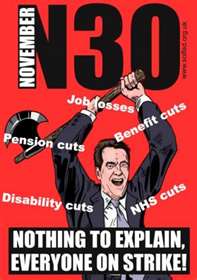HAS THE TIDE TURNED?

It is a surprising feature of the socialist press that it longer catalogues the ebbs and flows of working class struggle. Cheers of encouragement when
 the workers appear to advance are followed by glum silence on retreat. Yet for a brief period in Britain it appeared that there might be a sustained counterattack. James Fearon looks back at the pensions revolt.
the workers appear to advance are followed by glum silence on retreat. Yet for a brief period in Britain it appeared that there might be a sustained counterattack. James Fearon looks back at the pensions revolt.
Despite the fact that a simmering frustration lies just beneath the surface of a workforce that is under sustained attack the trade union leadership have got away once again with demobilising any consistent public display of that discontent. What should have been another show of force in May on a similar scale to that of November 30th last year was a damp squib with only relatively small groups of workers on strike. Bob Crow’s, let’s call it overoptimistic, suggestion that a general strike is just around the corner is highly implausible as no such plans exist and only 250 of the 79,500 RMT membership were on strike on May 10th. While the PCS did participate in a national strike the turn out for their national demonstration in London was appallingly low. Only 500 PCS strikers turned up to demonstrate at Methodist Central Hall while part of the state apparatus, nearly 30,000 off duty police, stole the limelight with a mobilization much more impressive than anything the trade union leadership could manage to organise. Anyone that hoped that the strike was going to be the opening shot in a protracted and determined struggle has serious cause to doubt Mark Serwotka’s view that the tide has turned. Although he states that “the tide is coming back”, meaning that it is now running against austerity policies, and the ‘show is back on the road’ against pension reform, the evidence points in the opposite direction.
The May 10th strikes were deliberately low key in an attempt to have negotiations reopened with the government. Mark Serwotka’s was attempting rapprochement with Dave Prentis, chair of the TUC’s public service liaison group responsible for renewing overtures to government, someone he previously described as being infected with ‘fatalism’, also points to an undue focus on negotiation. More strikes were planned for the end of June by the PCS who had promised to “build towards fresh walkouts at the end of next month with as many unions as possible, unless talks over the pension changes are reopened”. But should the talks reopen, what will they have to talk about? Further negotiations based on such a low level of struggle mean only one thing. Defeat!
With the interventions of Crow and Serwotka discounted, the overwhelming majority of the trade union bureaucracy have no intention of fighting, or even pretending to fight, leaving the efforts of both the PCS and RMT isolated. The TUC’s perspective extends only to patiently waiting for the election of Miliband who is around 10 points clear in the polls at the moment, but who has already debunked their ridiculous concept of a painless austerity by refusing to rule out cuts in advance of the election. Serwotka’s criticisms of Labour, mild as they are, and his attempted rapprochement with other civil service union leaders has immediately met with a rebuke from Chuka Ummuna of Labour, who urged the union leadership to keep Right, promote ‘competitiveness’ and not allow the “voice of protest” to drown out the image of themselves as “wealth creators”. This is music to the overwhelming majority of the bureaucracy’s ears. They cling desperately to the slightest possibility that a ‘plan B’ will be found and that Merkel will grant a fig leaf to Hollande, and by extension to themselves, by easing the austerity drive and allowing ‘fiscal easing’ to soften the blow, however marginally. This would play to their selfish illusions that they can weather the storm until a recovery occurs when they can then continue with business as usual, irrespective of course of the cost to the working class.
No consistent opposition to the already well-established assault on the working class is possible without the fullest mobilization of the trade unions’ huge membership. In order for this to be both possible and effective this can only be a mobilization in which rank and file union members find a way to take ownership of their organisations and to democratically control decision making. A huge gulf separates the overwhelming majority of members on low incomes from the handsomely remunerated bureaucrats that have no idea of what it is like to survive on a workers wage, and this must change. A good starting point is the campaign carried on by the Grass Roots Left [GRL] to have leaders elected who will accept an average industrial wage. Without a bottom up fight, and based upon that, a complete organizational overhaul, the present approach will lead to another sell out. Sending delegations from the existing bureaucracy, even its left wing, to negotiate in the face of a virulent and well organized capitalist assault on the basis of one or two days of declining industrial action will do nothing to thwart imperialism’s plans to save their banking industry at the expense of the world’s working class.
With the exception of the GRL, and the recent electricians struggle, no organized opposition has yet emerged within the demoralized body of the trade union movement and the bureaucracy gains strength from this. This demoralization is used as a tool to justify the bureaucracy’s position, they constantly parade it as a way of excusing their own inactivity; the petit-bureaucrats throw up their hands and complain that ‘a union is only as good as its members’. Their own culpability in the present lamentable situation is denied. The routinism of bureaucratic life; empty branch meetings with only the same functionaries and career orientated individuals turning up, meetings that are timed so that most members find it difficult to attend, moribund branches that still manage to nominate the most conservative candidate at election times, a turnout of 5-15% in those elections and no serious attempt to get people involved in union activities. This is the condition of our movement. If socialists are to make a conscious intervention in trade union affairs then it should be at this interface between the bureaucracy and their membership in order to help break, with utmost urgency, this cycle of decay and demoralization. This can only be done by building rank and file independence and not by befriending left leaning elements of the bureaucracy.
Workers will not be inspired by anything less.
Socialist Democracy (Ireland), July/August bulletin Has the tide turned?
